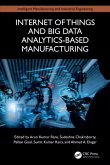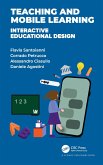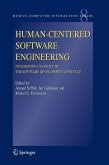Anita Khadka, Anto Cordelia Tanislaus Antony Dhanapal, D. Jeya Mala, Saurav Sthapit
Integrating AI Techniques into the Design and Development of Smart Cyber-Physical Systems
Defense, Biomedical, Infrastructure, and Transportation
Anita Khadka, Anto Cordelia Tanislaus Antony Dhanapal, D. Jeya Mala, Saurav Sthapit
Integrating AI Techniques into the Design and Development of Smart Cyber-Physical Systems
Defense, Biomedical, Infrastructure, and Transportation
- Gebundenes Buch
- Merkliste
- Auf die Merkliste
- Bewerten Bewerten
- Teilen
- Produkt teilen
- Produkterinnerung
- Produkterinnerung
Integrating AI Techniques into the Design and Development of Smart Cyber-Physical Systems: Defense, Biomedical, Infrastructure, and Transportation offers an introductory exploration of the fundamental theories and concepts of Artificial Intelligence and Machine Learning utilized in the building of dependable cyber-physical systems.
Andere Kunden interessierten sich auch für
![Ai-Driven Digital Twin and Industry 4.0 Ai-Driven Digital Twin and Industry 4.0]() Ai-Driven Digital Twin and Industry 4.0174,99 €
Ai-Driven Digital Twin and Industry 4.0174,99 €![Internet of Things and Big Data Analytics-Based Manufacturing Internet of Things and Big Data Analytics-Based Manufacturing]() Internet of Things and Big Data Analytics-Based Manufacturing142,99 €
Internet of Things and Big Data Analytics-Based Manufacturing142,99 €![Handbook of Digital Innovation, Transformation, and Sustainable Development in a Post-Pandemic Era Handbook of Digital Innovation, Transformation, and Sustainable Development in a Post-Pandemic Era]() Handbook of Digital Innovation, Transformation, and Sustainable Development in a Post-Pandemic Era242,99 €
Handbook of Digital Innovation, Transformation, and Sustainable Development in a Post-Pandemic Era242,99 €![Transition Engineering Transition Engineering]() Susan KrumdieckTransition Engineering154,99 €
Susan KrumdieckTransition Engineering154,99 €![Sustainable Energy Solutions with Artificial Intelligence, Blockchain Technology, and Internet of Things Sustainable Energy Solutions with Artificial Intelligence, Blockchain Technology, and Internet of Things]() Sustainable Energy Solutions with Artificial Intelligence, Blockchain Technology, and Internet of Things133,99 €
Sustainable Energy Solutions with Artificial Intelligence, Blockchain Technology, and Internet of Things133,99 €![Teaching and Mobile Learning Teaching and Mobile Learning]() Flavia SantoianniTeaching and Mobile Learning137,99 €
Flavia SantoianniTeaching and Mobile Learning137,99 €![Human-Centered Software Engineering - Integrating Usability in the Software Development Lifecycle Human-Centered Software Engineering - Integrating Usability in the Software Development Lifecycle]() Ahmed Seffah / Jan Gulliksen / Michel C. Desmarais (eds.)Human-Centered Software Engineering - Integrating Usability in the Software Development Lifecycle77,99 €
Ahmed Seffah / Jan Gulliksen / Michel C. Desmarais (eds.)Human-Centered Software Engineering - Integrating Usability in the Software Development Lifecycle77,99 €-
-
-
Integrating AI Techniques into the Design and Development of Smart Cyber-Physical Systems: Defense, Biomedical, Infrastructure, and Transportation offers an introductory exploration of the fundamental theories and concepts of Artificial Intelligence and Machine Learning utilized in the building of dependable cyber-physical systems.
Hinweis: Dieser Artikel kann nur an eine deutsche Lieferadresse ausgeliefert werden.
Hinweis: Dieser Artikel kann nur an eine deutsche Lieferadresse ausgeliefert werden.
Produktdetails
- Produktdetails
- Verlag: Taylor & Francis Ltd
- Seitenzahl: 336
- Erscheinungstermin: 2. Juni 2025
- Englisch
- Abmessung: 234mm x 156mm
- ISBN-13: 9781032787701
- ISBN-10: 1032787708
- Artikelnr.: 72656149
- Herstellerkennzeichnung
- Libri GmbH
- Europaallee 1
- 36244 Bad Hersfeld
- gpsr@libri.de
- Verlag: Taylor & Francis Ltd
- Seitenzahl: 336
- Erscheinungstermin: 2. Juni 2025
- Englisch
- Abmessung: 234mm x 156mm
- ISBN-13: 9781032787701
- ISBN-10: 1032787708
- Artikelnr.: 72656149
- Herstellerkennzeichnung
- Libri GmbH
- Europaallee 1
- 36244 Bad Hersfeld
- gpsr@libri.de
D. Jeya Mala is currently working as a Professor in the School of Computer Science and Engineering (SCOPE), Vellore Institute of Technology, Chennai, Tamil Nadu, India. She has more than 21 years of teaching and research and 4 years of industrial experience. She has completed a funded project from the Govt. of India and is doing several consultancy projects as well. Recently she is selected as a member of the National Level Workgroup on Quantum by TEC, Govt. of India, she is an Expert Evaluation Committee member for AICTE-NEAT to evaluate educational courses and software products for AICTE, the Govt. of India, and also an evaluator for Smart India Hackathon- a mega event of AICTE, Govt. of India. Dr. Mala has been granted a design patent and has published a utility patent under IP, Govt. of India. She has published three edited books and one textbook and more than 60 papers in reputed, refereed journals and conferences along with 15+ book chapters. Her MOOC course for Udemy has more than 2900 learners' enrollment and her textbook has been placed in several national and international university curriculums. She has received "Best Faculty of the year award -2024 (under specific innovations category) from Computer Society of India, "Best Techno Faculty Award" from ICTACT, Govt. of Tamil Nadu, and several other laurels and recognitions from reputed Govt. bodies and organizations. She is a member of professional bodies like IEEE, ACM, etc. and she forms the editorial and reviewer boards of international journals and conferences. Dr. Mala is listed in the "Who's Who list of the SEBASE repository" of the University College of London, UK for her research work in the area of Search Based Software Engineering. Her area of research includes Artificial Intelligence, Machine Learning, Deep Learning, Explainable AI (XAI), Software Engineering, Cyber Physical Systems, Cyber Security, etc. Dr. Anto Cordelia Tanislaus Antony Dhanapal is an accomplished Assistant Professor in the Department of Chemical Science at Universiti Tunku Abdul Rahman (UTAR), Malaysia. With over two decades of academic and research experience across India and Malaysia, she specializes in food science, nutrigenomics, and AI-driven precision nutrition. Holding a PhD in Food Science and Nutrition, Dr. Dhanapal is currently advancing the integration of artificial intelligence in precision nutrition, focusing on developing virtual digital twins and data-driven approaches to personalize dietary recommendations. She has spearheaded numerous research projects, securing 11 competitive grants in the last five years. Dr. Dhanapal has published over 60 research papers and book chapters, and her groundbreaking work has earned international recognition, including the UK-Malaysia Higher Institution Partnership Award. She is also a passionate advocate for public health, actively engaging in initiatives like the GENEY program to promote precision nutrition among Malaysian youth, further exemplifying her dedication to research, education, and societal well-being. Saurav Sthapit is currently working as an Assistant Professor (Research) at the Centre for Computational Science and Mathematical Modeling, Coventry University, UK. Before that, he was a Research Fellow in Cyber Systems Engineering at WMG at the University of Warwick. He received his BE degree in Electronics and Communication Engineering from Tribhuvan University, Nepal, his MSc degree in Embedded Systems from the University of Kent, England, and his Ph.D. degree from the Institute for Digital Communications, within the School of Engineering, University of Edinburgh, Scotland. Dr. Sthapit has more than 15 years of experience in industry and teaching and has published more than 10 research papers in reputed international journals. His research interests include Reinforcement Learning, Embedded Systems, IOT, Signal Processing, Simulation and modeling, Machine Learning, Computer Vision, Game theory, Operational research, Optimization, Automotive, and cyber security. Dr Anita Khadka is an Assistant Professor at the University of Warwick. Her research area involves Responsible AI investigating AI Resilience, and Assurance. She has contributed to several EPSRC-funded projects, including those on Robotic Artificial Intelligence in Nuclear (RAIN) and FAIRSPACE investigating the impact of adversarial attacks and developing defensive strategies to mitigate them. She focuses her research mainly on critical infrastructure including Healthcare, and Nuclear where the consequences of Adversarial Attacks can be high. She has published numerous papers in high-quality journals and conferences including ACM Computing Surveys, AeroSpace, and RecSys Conferences and has also secured grants funded by the University of Warwick and Sprite+. Dr Khadka has taught and supervised students across various levels, including undergraduate, Master's, and MSc apprenticeship programs, with a focus on Cybersecurity and Artificial Intelligence. She was an Assistant Professor at Northeastern University, London where she also held the Program Lead position for the MSc in AI and Data Science degree. She obtained her MSc in Intelligent Systems and Robotics from the University of Essex in 2012 and her Ph.D. in Computer Science from The Open University in 2020. She has extensive experience in both academia and industry.
Preface
Foreword
About the Authors
Section I: Introduction - Role of AI in Smart CPS Design and Development.
1. Role of AI Techniques in Smart Cyber-Physical Systems Development.
2. Security Challenges in the Development of Smart IoT.
3. Protecting CPS from Cyber Attacks using AI.
Section II: Application of AI and ML in Smart CPS Analytics.
4. Performance Analytics of CPS.
5. Vulnerability Assessment and Reporting for CPS using AI and ML.
6. Machine Learning Techniques in Cyber-Physical Systems Security
Analytics.
Section III: Smart CPS Development for Biomedical and Healthcare using
Advanced AI.
7. Smart AI-based Bio-Medical Systems and Tools.
8. Smart Nutrition Analytics using ML Algorithms.
9. Smart AI for Digital Twins in Healthcare.
Section IV: Trustworthy AI in Smart Defence CPS Design.
10. Security Aware Computing for UAVs for Defence.
11. Developing Trustworthy AI for Security Sensitive Defence Applications.
12. Smart Camera Network in Smart Defence Applications.
Section V: AI in Infrastructure and Transportation Management.
13. Smart Heating and Cooling Controller Design for Smart Infrastructure
Management.
14. Resilient CPS Design for Connected and Autonomous Vehicles in Smart
Transportation.
15. Application of AI in Secured Supply Chain Management.
Foreword
About the Authors
Section I: Introduction - Role of AI in Smart CPS Design and Development.
1. Role of AI Techniques in Smart Cyber-Physical Systems Development.
2. Security Challenges in the Development of Smart IoT.
3. Protecting CPS from Cyber Attacks using AI.
Section II: Application of AI and ML in Smart CPS Analytics.
4. Performance Analytics of CPS.
5. Vulnerability Assessment and Reporting for CPS using AI and ML.
6. Machine Learning Techniques in Cyber-Physical Systems Security
Analytics.
Section III: Smart CPS Development for Biomedical and Healthcare using
Advanced AI.
7. Smart AI-based Bio-Medical Systems and Tools.
8. Smart Nutrition Analytics using ML Algorithms.
9. Smart AI for Digital Twins in Healthcare.
Section IV: Trustworthy AI in Smart Defence CPS Design.
10. Security Aware Computing for UAVs for Defence.
11. Developing Trustworthy AI for Security Sensitive Defence Applications.
12. Smart Camera Network in Smart Defence Applications.
Section V: AI in Infrastructure and Transportation Management.
13. Smart Heating and Cooling Controller Design for Smart Infrastructure
Management.
14. Resilient CPS Design for Connected and Autonomous Vehicles in Smart
Transportation.
15. Application of AI in Secured Supply Chain Management.
Preface
Foreword
About the Authors
Section I: Introduction - Role of AI in Smart CPS Design and Development.
1. Role of AI Techniques in Smart Cyber-Physical Systems Development.
2. Security Challenges in the Development of Smart IoT.
3. Protecting CPS from Cyber Attacks using AI.
Section II: Application of AI and ML in Smart CPS Analytics.
4. Performance Analytics of CPS.
5. Vulnerability Assessment and Reporting for CPS using AI and ML.
6. Machine Learning Techniques in Cyber-Physical Systems Security
Analytics.
Section III: Smart CPS Development for Biomedical and Healthcare using
Advanced AI.
7. Smart AI-based Bio-Medical Systems and Tools.
8. Smart Nutrition Analytics using ML Algorithms.
9. Smart AI for Digital Twins in Healthcare.
Section IV: Trustworthy AI in Smart Defence CPS Design.
10. Security Aware Computing for UAVs for Defence.
11. Developing Trustworthy AI for Security Sensitive Defence Applications.
12. Smart Camera Network in Smart Defence Applications.
Section V: AI in Infrastructure and Transportation Management.
13. Smart Heating and Cooling Controller Design for Smart Infrastructure
Management.
14. Resilient CPS Design for Connected and Autonomous Vehicles in Smart
Transportation.
15. Application of AI in Secured Supply Chain Management.
Foreword
About the Authors
Section I: Introduction - Role of AI in Smart CPS Design and Development.
1. Role of AI Techniques in Smart Cyber-Physical Systems Development.
2. Security Challenges in the Development of Smart IoT.
3. Protecting CPS from Cyber Attacks using AI.
Section II: Application of AI and ML in Smart CPS Analytics.
4. Performance Analytics of CPS.
5. Vulnerability Assessment and Reporting for CPS using AI and ML.
6. Machine Learning Techniques in Cyber-Physical Systems Security
Analytics.
Section III: Smart CPS Development for Biomedical and Healthcare using
Advanced AI.
7. Smart AI-based Bio-Medical Systems and Tools.
8. Smart Nutrition Analytics using ML Algorithms.
9. Smart AI for Digital Twins in Healthcare.
Section IV: Trustworthy AI in Smart Defence CPS Design.
10. Security Aware Computing for UAVs for Defence.
11. Developing Trustworthy AI for Security Sensitive Defence Applications.
12. Smart Camera Network in Smart Defence Applications.
Section V: AI in Infrastructure and Transportation Management.
13. Smart Heating and Cooling Controller Design for Smart Infrastructure
Management.
14. Resilient CPS Design for Connected and Autonomous Vehicles in Smart
Transportation.
15. Application of AI in Secured Supply Chain Management.








